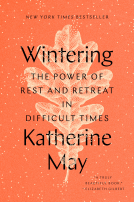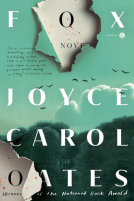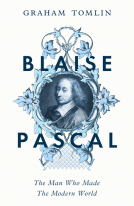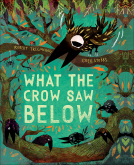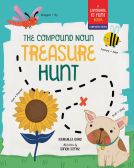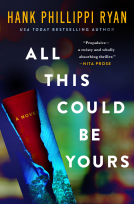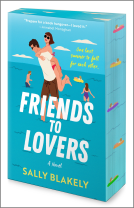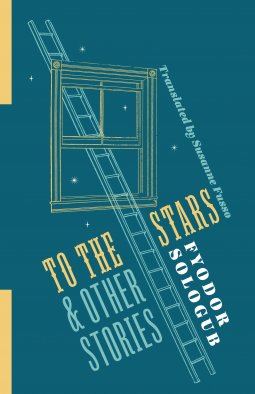
To the Stars and Other Stories
by Fyodor Sologub. Translated by Susanne Fusso
This title was previously available on NetGalley and is now archived.
Send NetGalley books directly to your Kindle or Kindle app
1
To read on a Kindle or Kindle app, please add kindle@netgalley.com as an approved email address to receive files in your Amazon account. Click here for step-by-step instructions.
2
Also find your Kindle email address within your Amazon account, and enter it here.
Pub Date Feb 28 2023 | Archive Date May 31 2023
Talking about this book? Use #ColumbiaUP #NetGalley. More hashtag tips!
Description
A boy who feels persecuted by the banality of everyday life yearns to ascend to the cold and majestic plane of the stars. A seamstress finds liberation of a sort in “becoming” a dog and howling at the moon. A club of young girls masquerade as the grieving fiancées of strange men. This book brings together these and other remarkable short stories by the Russian Symbolist Fyodor Sologub that explore the lengths to which people will go to transcend the mundane.
Renowned as one of late imperial Russia’s finest stylists, Sologub bridges the great nineteenth-century novel and the fin-de-siècle avant-garde. He stands out for his masterful command of both realist and fantastic storytelling; his play with language evinces a belief in its capacity to access other worlds and other levels of meaning. Many of Sologub’s stories are set among children whose alienation from the adult world has lent them imagination and curiosity, enabling them to create an alternative reality. At the same time, he bluntly examines the sordid realities of late imperial Russian society and frankly presents sometimes unconventional sexuality. The book also features a selection of Sologub’s “little fairy tales,” ambiguous parables couched in childlike language whose ingenuity anticipates the miniatures and “incidents” of Daniil Kharms. Susanne Fusso’s elegant translation offers these artful tales to an English-speaking audience.
Fyodor Sologub (the pseudonym of Fyodor Kuzmich Teternikov, 1863–1927) was a major Russian Symbolist poet and prose writer. The son of a tailor and a maid, he began his career as a provincial high-school teacher and attained literary fame in St. Petersburg at the turn of the twentieth century. He is best known for the novel The Petty Demon.
Susanne Fusso is Marcus L. Taft Professor of Modern Languages and professor of Russian, East European, and Eurasian studies at Wesleyan University. Her translations include Nikolai Gogol’s The Nose and Other Stories (Columbia, 2020).
Advance Praise
"Sologub's prose is beautiful: limpid, clear, balanced, poetical, but with a keen sense of measure. . . "
—Dmitri Svatopolk-Mirsky, author of A History of Russian Literature: From Its Beginnings to 1900
"His vivid, honed, stinging style, which combines simplicity and elegance, coldness and fire, tenderness and austerity, keeps getting more and more supple. His anguishing conceptions more and more convincingly lift the cover of enchantment that all of reality turns out to be. He is the singer of death: but he sings of death with all the tenderness of a prayer, all the ardor of passion; he speaks of death the way a passionate lover speaks of his beloved."
—Andrey Bely
"Alternately funny and frightening, charming and chilling, Sologub's short fiction remains curiously undervalued. Fusso's excellently selected and masterfully translated collection, accompanied by an exemplary introduction and copious notes, finally allows readers of English to appreciate the full power of Sologub's relentlessly double vision and the depth of his literary craft."
—Stanley J. Rabinowitz, Amherst College
Available Editions
| EDITION | Other Format |
| ISBN | 9780231200059 |
| PRICE | $17.95 (USD) |
Available on NetGalley
Featured Reviews
 Mandy J, Reviewer
Mandy J, Reviewer
One of the lesser known Russian writers, Fyodor Sologub (1863-1927) was a Symbolist poet, novelist, short story writer, playwright and essayist, celebrated in his own time but now largely neglected. On the basis of this wonderful collection, it’s certainly time to bring him to a wider audience. All the stories are pretty dark, with a mix of realism and the fantastic, sometimes quite quirky, with some startling imagery on occasion, and often tragic. I particularly enjoyed the ones focussing on children, however disturbing. There’s an excellent introduction, which is pretty much essential and extremely helpful. I’m very happy to have discovered Sologub and recommend these stories, especially to Russophiles who may not have read him before.
A boy who longs to join the stars. A man advertises for lady Death to haunt him. A club of young women poses as grieving fiancees. These are just a few iconic stories from Russian author Fyodor Sologub’s translated collection, “To the Stars and Other Stories.” Imaginative with a dash of darkness, his stories are essential for anyone interested in diving into Russian literature.
With a wide variety of short stories, Sologub’s stories range from the fantastical, strange, saddening, haunting, and unconventional. Many of his stories are focused on children experiencing isolation from the world and creating their own alternate reality filled with child-like wonder. Some of the later stories take a darker or more provocative turn to examine the sociopolitical climate of imperialist Russia. There’s no doubt that Sologub’s writing style is as fantastical as his stories. Still, he somehow bridges the gap between reality and fantasy with surprising clarity and wonder.
Sologub weaves themes of life, death, isolation, fantasy, delusion, nihilism, suffering, and peace into these stories. Although these stories are centered around children, they tackle difficult and saddening topics in an adult but the easy-to-read manner that a kid could read and easily understand the author’s intentions.
“To the Stars and Other Stories” is the perfect introduction to Russian literature for readers without the time commitment of Tolstoy. Steeped in fantasy, magical realism, and surprises, Sologub’s stories will transport you to your own imaginative world.
<i>“I take a piece of life, coarse and barren, and I create out of it an ambrosial legend, for I am a poet. Stagnate in the darkness, or rage with a furious fire – I, the poet, will erect above you, O dim and everyday life, my created legend about the enchanted and the beautiful.”</i> Fyodor Sologub
A thoroughly captivating and enigmatic collection of turn-of-the-century stories by Russian author Fyodor Sologub (1863-1927). This highly-commendable translation and interpretation carefully preserves the original context and makes each story more accessible to the modern reader.
The stories contain something of his trademark pessimism and a gothic-horror feel as they contemplate life and death; the beautiful prose brims with symbolism and realism. The collection often portrays rather mournful, melancholic subjects and dreamlike, surreal tales of beauty, (unrequited) love, and loneliness. Many of its observations are as acutely relevant today as when they were written.
My thanks to NetGalley and Columbia University Press for granting this e-ARC in exchange for an honest review.
 Kyle C, Reviewer
Kyle C, Reviewer
Many of Sologub's stories combine an eerie mix of jaunty fairytale and nihilistic cynicism. A lonely boy bullied by his tutor dreams of visiting the stars, jumps from his balcony, and dies. Another boy thinks he saw his doppelgänger lurking outside the window. In his dreams, he imagines that his double runs away to an elven kingdom to dance with the princess—but in fact the household maid is just dressing up as him in disguise in order to visit a disreputable inn nearby. In another story, a group of boys tries to find a magical spell to release a boy who believes he is the captive of an evil fairy; they ask a peasant woman and dutifully recite her suggested words—a screed of obscenities. In each story, a bleak reality disrupts the folktale setup of the child's imagination. Abortion and suicide are omnipresent in Sologub's stories, and children often die, the unwitting victims of their own innocent aspirations.
By far two of my favorite stories are "Death by advertisement" and "The Saddened Fiancée". In the former, a man finds a woman's plea in a newspaper asking for money. She describes herself as a cultured and educated woman and in desperate need of money for her children. When the man sees this, he immediately writes to her, promising to give her the money, provided that she does something for him in return. He says that as a cultured and educated woman, she should know what he means—to appear to him in the form of his death. When she agrees, the man is full of eager excitement, wondering how she will appear. However, when she does meet him, dressed blandly in pale white, he is unimpressed. He asks for her name but she simply says Death. He finds his "death" to be uncouth and tries to escape. The story is a superbly novel allegory about the banality of death, something which cannot be interrogated or delayed. Once he forms expectations about death, it inevitably becomes disappointing.
"The Saddened Fiancée" is genius. A woman, Nina, joins an exclusive sorority of girls whose single mission is to attend the funerals of young men who have died by suicide. When one of them sits weeping in the pews, dressed in mourning clothes, everyone wonders who she is. The mourners assume the unknown girl must be the hapless lover of the deceased. They speculate on whether the young man's death was the result of some unrequited love or tragic romance. Nina, however, has come to believe the deception. She thinks her future fiancée, whoever he may be, has already died by suicide. She is tormented by this conviction and one day, when she attends the funeral of another young man, even though she consciously understands that she never knew him, she comes to believe that this must be the fiancée she would have someday married. Both stories show desperate people using strangers to create their own alternative illusions of love and death, both with tragic results.
Sologub's characters feel a deep sense of alienation. They are nauseated by the assumptions, prejudices and expectations of the world around them. In "Beauty", for example, a young girl undresses in front of a mirror and admires her naked form. However, when the maid sees this and teases her, the girl is wracked with shame. She imagines herself constantly under the gaze of judgmental onlookers. She comes to believe that her body is ugly and contemptible and the whole world is hostile to her, and this just makes her more obsessed with her body. Sologub presents characters who are lonely and marginalized in a world of oppressive bourgeois norms. They find soulmates in other lonely and ugly people, or else in corpses.
This is a great collection of stories. Particular commendation for the translator's deft ability to capture Sologub's experimental style (I particularly liked the story "the two Gotiks", in which the constantly punning brother jokingly says "wide yew ache us?" for "why'd you wake us?" I don't know the original Russian, but I admired the verbal dexterity to recreate these puns in English). Thanks to Netgalley and publishers for letting me read this!
 John L, Reviewer
John L, Reviewer
I'll admit there was a bit of me asking myself if I should even be reading this book. For one thing there's the fact the author is Russian, and while he's not exactly involved personally in the invasion of Ukraine, I passed up on some cheap Russian liquor this week and should stick to my boycotting guns. The other factor is that this publisher pays to get books on sites like netgalley, where they presumably want erudite, intelligent specialist readers, to go along with their academic purpose, and not the general Joe Bloggs average commuter type of reader. But persistence pays off in spades sometimes – this Joe Bloggs average browser thought this was a remarkable, and thoroughly accessible, collection of short tales.
A young lad dislikes being cosseted, and finds the whole group of people – tutor, extended family, etc – he's spending the summer at a dacha with quite disagreeable. It's not like he permanently wants to get a rise out of them, rather he wants to ascend to the purity and new message of the stars he worshipfully looks at at night. Also wanting an 'elsewhere' is a young woman who develops a nightly naked routine kind of akin to a dance, pure and purely for herself, when she loses her mother, but who finds it sullied when she is aware of other opinions as to its beauty and purpose.
We see a theme instantly the third piece starts, which you'll have to decide is a good thing or not, for the very counterpart to the opening kid – same extended family and tutor, etc – decides he's actually an imprisoned prince, and his mother an evil fairy in disguise. Wanting a connection with three scamps outside his 'captivity', he sees them as friends and as a way out. Most memorably, then, we have a diversion to older children – and what happens when one of them wakes in the night to see his doppelgänger run off in the clothes he'd just left outside his room for the laundress. This is someone privy to a second life, an 'elsewhere' again, yet without knowing he sought it. The piece is a marvel, even if the mundanity of the ending irks our introduction writer and translator – the bigger problem is the lad's brother, who needed strangling at birth.
Still, speaking of diversions – we have a tale of some Roman soldiers en route to finish off their raping and pillaging with a bit of the former, when they turn on a group of children containing an antagonistic example, much to their later regret. Finely-written, and of the right time period for this book, it still feels out of place in such a curated collection. Also out of place, partly for content but mostly for enjoyment level, is a tale of a crush at a civic fair for a city's anniversary. While this is a world away from the likes of Altamont, and a century removed from the brainless response many have these days to 'hot tickets' it has no small affinity with, it's repetitive in the extreme and a joyless plod.
From such morbid themes we switch to a man wishing an 'elsewhere' – of a kind – as he asks to employ a woman to perform as Death for some variety to life. Be careful what you wish for. Next, the shortest work here, that asks whether your character forces people to liken you to animals, or is it the opposite, and their opinions of you bringing out your nature? Either way, it's time for a second standout, and a look at a peculiar female gang of women who dress and act as the fiancée of any single young bloke who dies; in concentrating on one such, going around in her mourning clothes and surely taking it all too far we see the Sofia Coppola film to end all Sofia Coppola films.
Another 'elsewhere' is to be had with a young lusty maiden going to the desert for well over forty days and relishing the fact the temptation only grows. Ripely fruity language tries to disguise base, carnal acts when it's succumbed to. Someone else wants a different situation, when a young woman we're told is plain stars, in a work co-written with the author's partner/wife; at first we think she might be in need of an abortion, but the opposite is the truth – can she find a world of the love she needs? A different woman finds a strange response to a suicide in the family. And before we close with a motley collection of short shorts, some of which don't work at all, we see a woman wanting/letting/expecting the torture her husband gave her to resume annually, even after his death.
With such contents it almost feels as if a closing paragraph is pointless. Who could not be intrigued by such ideas and stories? Not me, for one. The translation here allows this to feel modern and readably contemporary, without ever having a flash of style for style's sake, or what is now an antiquated approach. These read a heck of a lot closer to your favourite genre writer or folklorist than they do to the regular Russian stylist. The volume is suitable for the academic, as are all in this specialist university press imprint, and the contents are too – it's just that they're suitable for anyone intrigued by the slightly macabre, the fantastical and the otherly. You might think of someone like Angela Carter as a mistress of transformations, but one step removed is the wish for a change in circumstance, and by hint or by dint, Sologub with his cast of oddballs (and a female Death, on multiple occasions) comes here as a master of that wish. Four and a half stars, and a greater determination than ever before to stick with this imprint.
It is no secret that I love this series of lesser known Russian works, I am already on to another one (Sisters of the Cross by Remizov, who apparently, is a fellow Symbolist of Sologub's). First of all I would like to thank Columbia University Press and Netgalley for this ARC, I’m addicted to this series and want to collect them all eventually. Now settle in for a long review...
The introduction of this books starts with a quote from Sologub, saying
”I take a piece of life, coarse and barren, and I create out of it an ambrosial legend, for I am a poet. Stagnate in the darkness, or rage with a furious fire – I, the poet, will erect above you, O dim and everyday life, my created legend about the enchanted and the beautiful.”
This is one of those times were I feel like, wow, you must’ve have been absolutely insufferable to spend any kind of time with, but boy, do I want to read your works. I feel kind of similar with Lev Tolstoy to be honest (is that controversial?) Reading Sologub is definitely an experience, he weaves together something enchanting and fairytale like with the realism of life and death. Like the introduction also addresses, he really knew how to capture children and their mindset. It really takes you back to being a child yourself and the kind of fears, fantasies, and whimsies that you got caught up in.
My thoughts on this collection in total is that if I was a teacher I would definitely assign it as reading to the dark-clad goth/emo kids because DEATH is a very central theme, the suffering of life is another, and so is the influence of fantasy on our mind and well-being. But in general I would recommend this to anyone with an interest in thinking about the balance of life and death (people often speculate a personified 'Death', but what about when you meet a personified 'Life'... impressions may vary). But obviously, it is also a must-read for anyone with an interest in Russian literature.
Some thoughts on each story of this collection:
To the stars (1896): What a way to kick off the book, it really sets the tone. This story was disconcerting, as the main character Seryosha was quite an unsettling little child. Like, the story capture how children can feel powerless, yet there is something quite unique about Seryosha… something rather menacing...
”He thought that if he were strong, he would make Aunt Katya get on her knees before him and ask forgiveness. But no one else would be there at the time, so that there wold be no one to laugh. And he would take Aunt Katya by the ear and say to her, ’Watch out, you’ll catch it worse the next time.’
Yikes...
The end of the story left me feeling a bit confused as to what happened and what to feel about it. In a good way, but still a bit bemused.
Beauty (1899): This story was quite sad and profound. There is again a kind of tense relationship between death and beauty, it is quite captivating and haunting.
”It was oppressive for Elena to be with people. People tell untruths, flatter, get excited, express their feelings in an exaggerated, unpleasant way. There is a lot about people that is absurd and ludicrous: they conform to fasion, use foreign words for some reason, they have vain desires.”
And ain’t that a timeless truth.
In Captivity (1905): This story was enchantingly childlike and really put you into the minds of children. It was sad but felt very real. It was one of my favorite stories and definitely one I’d love to re-read just to catch that glimmer of genuine childlike-ness again.
”The demon of comparison is a very petty demon, but one of the most dangerous. He doesn’t tie himself to strong people – he wouldn’t have any luck with them – but he loves to tempt little ones. And his temptations for the small and the weak are irresistible.”
The Two Gotiks (1906): This one was pretty funny but not my favorite. It is a bit of a mystery weaved in with a dreaminess that leads the even the conclusion to feel quite ambiguous.
The Youth Linus (1906): Ugh. I kind of hated this one because I hated Linus, I don’t think you’re supposed to hate Linus. But Linus is a real ”type” that I can’t stand and the ending did not make up for it. The ending does seem to glory in horror and gruesomeness, which has some effect but also seems to be a bit overdone. The glory of truly righteous anger is still weak and overrated.
In the Crowd (1907): This one is probably my favorite but in a sense also the one I hate the most because it will give me nightmares. I cannot stop thinking about it. I feel claustrophobic and weepy when I do think about it, which is not a bad feat for a writer since it is quite a short story and it’s been days since I read it.
Crowds were, are, and will continue to be the WORST. People en masse are a genuine nightmare.
”And the devilish masquerade kept on going, agonizingly. And it seemed that there would be no end to it, no end to the boiling of this satanic cauldron.”
Death by Advertisement (1907): ”I am your death”
Eerie and strange. I kind of loved it, it left a feeling that is hard to shake. I’m still wrestling a bit with the end and how to interpret it..
The White Dog (1908): What just happened? I barely know what to say of this one. I want to ask if this is magical realism, or just realism revealing what our minds do to us? We are very impressionable creatures and sometimes that has sad results.
The Saddened Fiancée (1908): Another one that speaks to the influence of fantasy on our mental and physical state. I really liked this story and found it very capitvating, essentially it is about a group of women who – upon the announcement of a young man’s death – goes to his funeral pretending to be his secret fiancée. It is peculiar but a good set up for the story as it plays out. Again, quite haunting and leaves a lasting impression. Perhaps unrequited love (in life) is best love, the most invigorating love for the self and its potentiality for action? (Not that I approve of the task she seems to undertake). The idea of love may give us more impetus and satisfaction than the reality of it.
The run-on sentences were a bit much sometimes though.
The Sixty-seventh day. A novella. (1908): This one was apparently part of a journal that was criminally charged with essentially being porn and this IS a very sensual story. I wouldn’t say pornographic (by today’s standards) but there is a definite sensual sexuality here that is very appealing. Back in 1908 I can imagine it would’ve been problematic.
”If heat lightning trembles in the two skies of the nude maiden’s bottomless eyes, flickering dark-blue through her long, smoky, arrowlike eyelashes, then that dark-blue coldness is transformed into a dark-blue flame, and all of her, the bared maiden, is the burning bush.”
… wow, girls, get you a guy who equates you with the burning bush! It is skirting blasphemy but what the heck.
The Road to Damascus (1910): This one is interesting because this is the only one in the collection that Sologub co-wrote with his wife. Now, I definitely felt that there was a sentimentality to this story that wasn’t in the others, it felt like it had a different – more genuine – perspective from women (no surprise) and an end that felt somewhat contrary to Sologub’s usual tastes. It is a good story though, I don’t want to make it sound like his wife was a bad influence on his writing, it was just different from the others in this collection. It felt like a good balance to the others though and kept his style from getting too predictable and banal.
This though: ”and the elegant gentleman with his yellow-white, almond like teeth…”
Almond-like teeth… is that a good thing? Or no? I’m not sure. What are almond-like teeth?
The Kiss of the Unborn Child (1911): This one was rough, sad, a bit nihilistic, but realistic and moving. It captures the spirit of many of his time and the hopelessness of their circumstances (and many in the present). Again we get a very intimate perspective from a female protagonist (his wife seems to have been a pretty good influence on his writing in that aspect) and it is insightful and moving, it adressed some psychological aftermath of difficult situations like heartbreak and abortion. Mostly it crushed your heart for the plight of women and the poor and hopeless.
Also, I definitely agree with the protagonist that the resin smell of a warm pine forest is far superior to the smell of roses.
The Lady in Shackles. A Legend of the White Nights (1912): Oh dear, eerie and haunting. I want to say it is kind of perverted but I can’t explain how, I feel like there is something taboo about this.... even if by today’s standards it is pretty tame. But if you follow the story and let its full implications get into your imagination… I think you’ll get my drift. I can definitely see that in 1912 that would’ve been the reaction. And as mentioned above, is this magical realism or just hyperrealism and a commentary on the stories we tell ourselves to live? I love pondering this.
Little Fairy Tales (selection, 1898-1906): These little fairy tales were one of the best parts about this whole book, they were such amazing social commentary in a miniature format… it reminded me of how amazing Tolstoy was at telling short stories. It takes a real talent to squeeze a genuine and resonating moral into a couple of sentences.
”The hammer and the chain” and ”Bullies” were favorites and kind of a commentary on the state of politics and ideologies forever and ever. Which is pretty sad.
This was a long review, but long story short – this book is totally worth your attention if you enjoy ruminating on the tension between life and death, suffering and peace, and which is which. Sologub was a pleasant surprise and I hope to see (if it hasn't already been released) "The Petty Demon" from him as well.
Firstly, MASSIVE MASSIVE THANK YOU TO NETGALLEY AND COLUMBIA UNIVERSITY PRESS FOR APPROVING ME TO READ THIS ARC AND OF COURSE TRANSLATING THE WORKS OF FYODOR SOLOGUB.
This book is a collection of Russian short stories that tackle the how and what shapes life. It has themes of as much as beautiful and comfortable imaginations are - they can also be dangerous; how naivety plays a larger role in life; how greed and ambitions can turn people into animals; how inhuman humans are.
These are just some of the themes this book has. Fyodor Sologub was known for being a symbolist poet, and this book resonated with that. It has a lot of symbols that I can easily make an essay about it all. I was fascinated by how careful and intricate his writing was, dedicating effort that gives emphasis to his characters' emotions.
Not only that, but in every story, he crafted authenticity that would blow your mind to awe. His works are now one of the reasons why I find Russian literature interesting and beguiling.
 Mirabel G, Reviewer
Mirabel G, Reviewer
I really enjoyed reading this. It was intricate and beautifully written, and I learned a lot since I have very little knowledge of Russian literature, so I went into this knowing basically nothing. The problem, however, was that it took me quite some research and effort to understand what was going on in the book at many points.
By far, my favorite story was "Death by Advertisement". It begins with a woman desperate for money and ends up being an allegory to the inevitable essence of death. Sologub's characters are all incredibly real and unique, being faced with problems such as body image, bullying, etc. I thought they way these problems were all portrayed in a very smart way, which is something I admire about Sologub's writing.
All in all, I had a wonderful time reading this. It was a well done translation!
This is a good collection of mostly rather grim short stories. They're well-translated, which must have been a challenging task--wordplay is difficult to convey between languages.
Sologub is not one of the better-known Russian writers in the English-speaking world, and even for readers with an interest in Russian literature, little of his work aside from The Petty Demon tends to be readily available in translation. This collection does a good job of making his short stories more accessible to an anglophone audience.
Like the other books I've had the pleasure of reading and reviewing in the Columbia University Press Russian Library, the introduction is interesting, engaging, and does an excellent job of presenting the background and context for Sologub and his work.
I know that current events have changed the funding available for this series of translations; I sincerely hope that the project will continue to provide such high-quality translations of works that haven't been widely available in English despite these challenges.
 Reviewer 1037375
Reviewer 1037375
If you like Russian literature, then this book should appeal. This collection of short stories, written in the early 1900s by Russian writer, Sologub are quite dark, despite being centred around children. Sologub is known as a symbolist poet, who referred to himself as the bard of death. His pessimism is evident in this collection of stories and made me want ro read more about the writer.
It is due to be published by @columbiauniversitypress on 28 February. 4⭐️
Sologub's storytelling is beautiful, and Fusso's translation is clearly very thoughtful. I am not often someone who will pick up a short story collection, but I am delighted that I chose to read this one. My personal favorite in the collection is "Beauty". I intend and am excited to read more of Sologub's work.
“To the Stars and Other Stories” is a gratifying collection of Fyodor Sologub’s early 20th century short stories and novellas, translated by Susanne Fusso. Highly imaginative storylines explore delightfully absurdist premises with minimalist prose that nonetheless paints vivid pictures of life in Russia before the outbreak of WWI. A time capsule for quotidian pleasures and innocent narcissism; Sologub’s characters are often self-centred and entirely consumed by their own desires - both the physical and the metaphysical. There is a theme of existentialism as characters fight against the constraints of family, society, and themselves, often finding their release in death. Sologub’s main characters are mostly children or newly minted adults, allowing him to play with their metamorphic nature; questions on the nature of being, on beauty, on life, and on death are all the more natural in their presentation. Unconcerned by the need for lengthy explanations, Sologub achieves a surreal landscape that is unconcerned with accuracy: a fantasia at times as in “The Sixty-Seventh day: A Novella” and “In Captivity”, wonderfully speculative in his proposition of oddly realistic scenarios as in “Death by Advertisement” and “The Saddened Fiancée,”, and haunting with the mania extending from senseless murder in “The Youth Linus.” A well-curated collection of stories that span more than a decade of Sologub’s career, each story a curious delight, I highly recommend “To the Stars and Other Stories.”
 Elina A, Reviewer
Elina A, Reviewer
The stories of the book depict human pain and an imagination of the mind. Some stories may have a sad ending where a reader is left intrigued. Beautifully translated.
5/5 if Dostoyevsky wrote children's stories - Yes it's that good, yes it's that heartbreaking.
This is a collection of short stories told from the point of view of children living in historical Russia, for an adult audience. If you love short stories, if you love magical realism, if you love Russian symbolism, this book is for you.
I fell in love with Russian stories in AP English class reading Dostoyevsky, Tolstoy and Chekov, but the writing of Fyodor Sologub showed that there is this amazing unexplored gap in my reading. While many of this collections' stories are set among children, they are written for adults in such a clever way. We put ourselves in the place of children, feeling their alienation from adult society, while also being drawn towards the unknowing parts of nature (stars, forests, birds).
Get your highlighters ready because the way Susanne Fusso has translated these stories keeps the prose beautiful and startling. Sologub's stories are rooted in a specific time and place, but with Fusso's help we are able to straddle the line between existing in a dacha (Russian cottage), and in our own neighbourhood.
I recommend reading this book to your childhood stuffed animal, outside under a canopy of stars.
Thank you to NetGalley and Columbia University Press for an advanced reader copy.
Readers who liked this book also liked:
David Toht
Crafts & Hobbies, Home & Garden, Professional & Technical
